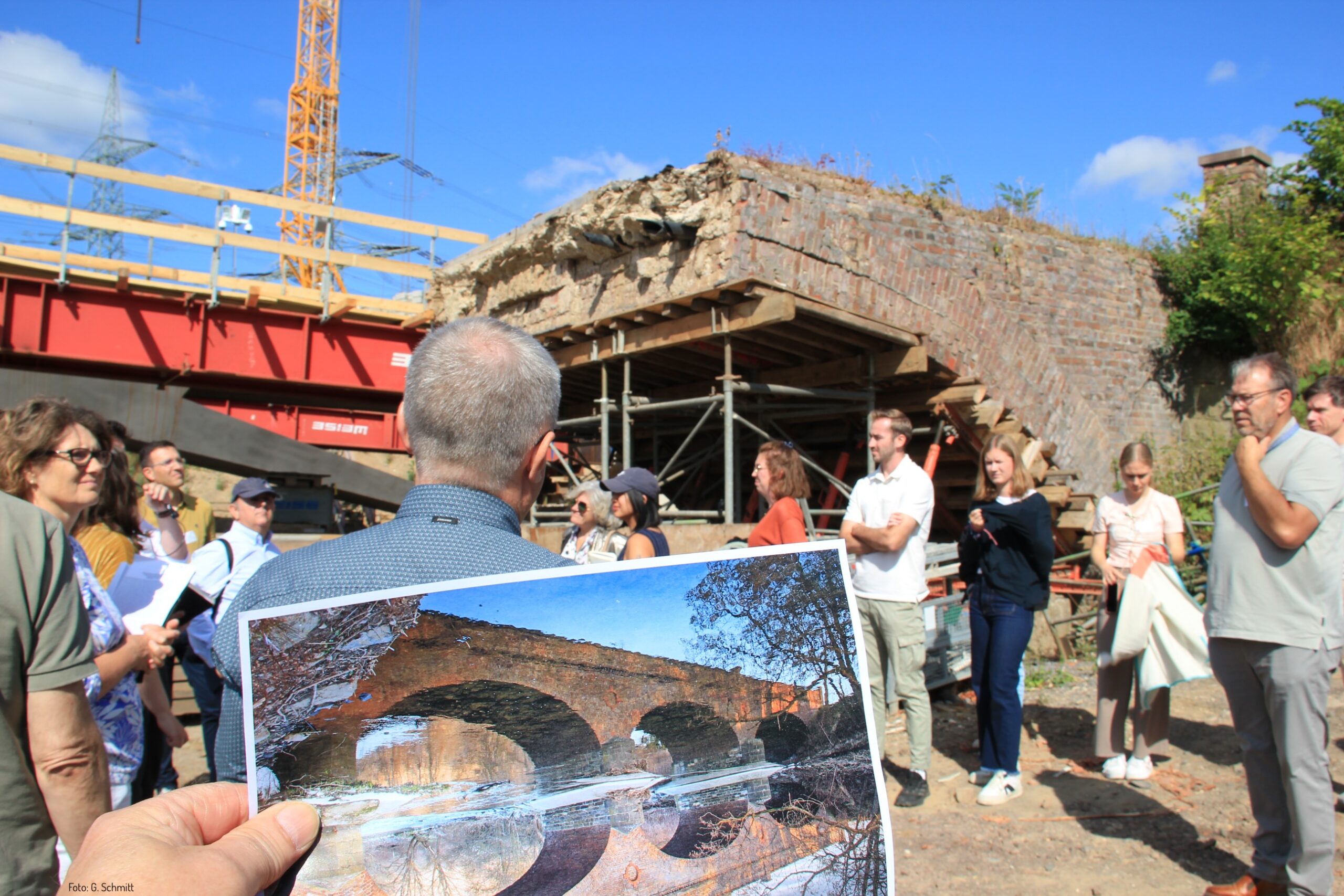
07.2025 4th anniversary of the flood in the Ahr Valley – International experts focus on cooperation
Cooperation, cohesion and good communication between all stakeholders in the region leads to resilience
Flood disasters are local signs of the climate crisis, but the problem is global. That is why international meetings help to cope with and adapt to the new situation. To mark the fourth anniversary of the flood disaster in the Ahr Valley, Thinking CircularÒ organized an excursion in the Ahr Valley, workshops at the Environmental Learning School Plus of the AWB Niederzissen and a conference on the Remagen campus. The conference brought together scientists, engineers, business representatives and stakeholder associations from Germany, the Netherlands, Italy and Spain. They were supported by a network of companies that value the approach of intensive European exchange.
Excursion to the Ahr valley reveals strong similarities
The obvious analogies between the floods that hit Germany in 2021 and the floods in Valencia in 2024 provided concrete food for thought. The excursion to the Ahr Valley and the scientists’ findings were particularly decisive in this regard. In the Ahr valley, there were expert explanations from Markus Becker at the Sinzig sewage treatment plant, from Robert Füllmann at the Lohrsdorf floodplains and from Maximilian Kranich from the district town’s construction and development company, as well as from Maximilian Schell from Zukunft Mittelahr about a new approach to bridges at the Heppingen bridge. He gave his tour under the title “Dernau: A village reinvents itself”. The participants Rosa Álvarez and Carmen Gil, President and Vice President of the Association of Victims of Dana 29O, who were themselves affected by the floods in Valencia, concluded: “If you look at how Germany is doing four years later, we’re not doing so badly in Valencia.”
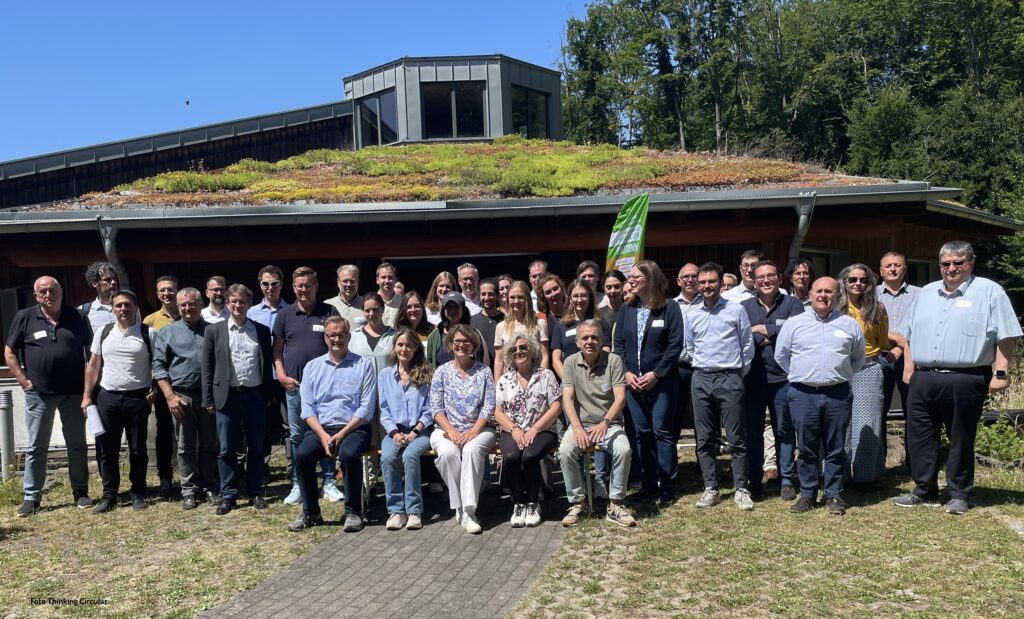
Teilnehmer Exkursion und Workshops Donnerstag, 03.07.2025
There are also differences
However, the different appearance of the affected regions is mainly characterized by the valleys and the wide mountains that fed the overflowing rivers. One common element is the similar number of fatalities. According to Rosa Álvarez and Carmen Gil, the admirable response of the city of Valencia after the disaster and the volunteer help in the Ahr are key factors that explain why the situation in Spain allows for a positive outlook after looking at the reconstruction in the Ahr valley. “Hope is what keeps us going,” they emphasize.
“Hope, resilience, reparation and justice – we must not forget that, because it is very important.” Both Álvarez and Gil were able to speak to people who, like them, were affected by the horrific impact of the tragedy in a region of Germany that is still anchored in the events of 2021. They spoke to Heimersheim architect Udo Heimermann, among others, to find out how he experienced these dramatic hours and how he contributed to the gradual return to normality. The lesson learned: “Cohesion within the region is the decisive factor – as in the Ahr Valley, so also in Valencia after the damage caused by the Dana.” Another lesson is that the safety measures implemented must be guided by the principle of cooperation between administrations – a variable that did not work completely in either of the two disasters.
Exchange is needed
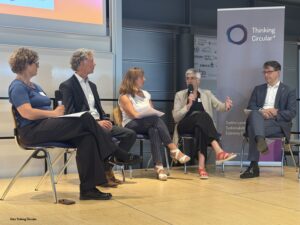
v.l.n.r.: Eveline Lemke, Arthur tenWolde, Claudia Mensi, Jutta Paulus, Michael Hauer
The conclusion of the event, which was attended by around 100 experts and at which they also met with the State Secretary of the Ministry of the Environment, Michael Hauer, and MEP Jutta Paulus (The Greens), was: “It is necessary to have a direct exchange between those affected, the reconstruction managers in the municipalities, the scientific community and the authorities.” Gaining mutual knowledge helps to classify one’s own challenges and enables learning from an outside perspective. “The participants want to continue working towards this,” says Eveline Lemke. Against this backdrop, the results were summarized in a final document from Thinking CircularÒ , which also represents a call to the EU to facilitate this type of cooperation. You can find the final document in German, English and Spanish here:
https://thinking-circular.com/wp-content/uploads/2025/07/Ergebnispapier-4.7.-DEENES.pdf
The issues of the final paper were discussed with Michael Hauer (State Secretary for Climate Protection, Environment, Energy and Mobility in Rhineland-Palatinate), Jutta Paulus (MEP, The Greens/European Free Alliance), Claudia Mensi (President of FEAD European Waste Management Association) and Arthur ten Wolde (Executive Director of Ecopreneur.eu).
The participants advocated strengthening cooperation to exchange experiences and, in particular, ensuring that water, waste and soil management is strengthened across sectors early on in the crisis.
Further insights and presentations:
Dr. Jorge Alacid López holds a doctorate in communication theory, is a journalist and coordinating director of the newspaper Las Provincias, the largest and oldest media house in Valencia. In his presentation, he emphasized the role of the press in education and in the fight against fake news by providing solid information so that the region can develop. He also put the participants in an emotional mood for the event when he showed this video about the work of his journalists:
https://www.youtube.com/watch?v=PzAJfuLCJU8
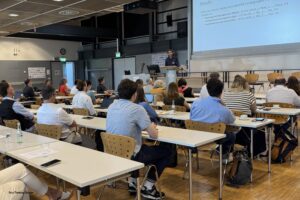
Dr. Miguel Àngel Artacho Ramirez
Waste management is not automatically included in emergency plans or crisis groups. This must change, as waste management is a central element of post-crisis care. This was the conclusion reached by a group of scientists from Germany and Spain. The presentation by Prof. Miguel Ángel Artacho Ramirez, PRINS, Polytechnic University of Valencia, can be found here:
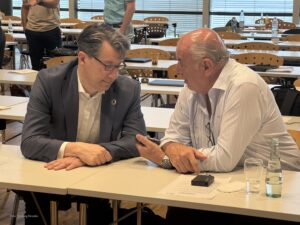
StS Michael Hauer, Salvador Ortí
Salvador Ortí from the Clean Waste Cluster in Spain is working to improve the polluted environment and is making environmental technologies available through his network. Those involved hope that this will make it easier for the authorities to comply with EU waste directives and environmental regulations. Click here for the presentation on the cluster’s role in the flood disaster:
Prof. Joan Estrany from the University of the Balearic Islands and head of the Observatory for Natural Risks and Emergencies on the Balearic Islands was able to report on the Riscbal environmental monitoring network that has been set up. Whether flood risks, forest fires or gravitational hazards: The early warning system is based on real-time data and modeling and is designed to save lives. Click here for the presentation:
https://thinking-circular.com/wp-content/uploads/2025/07/4.estrany_ahr_valley_25.pdf
Prof. Dr. Alexander Fekete from the Technical University of Cologne focuses his research on cooperation between stakeholders. He describes this as a key success factor. The interactions between crisis, waste, water and soil management are of central importance.
https://thinking-circular.com/wp-content/uploads/2025/07/250704-Fekete-Ahrtal.pdf
Prof. Dr. Lothar Kirschbauer from Koblenz University of Applied Sciences reported on the KAHR science network, Dr. Bert Droste-Francke from IQIB complemented him. You can find the presentations here:
https://thinking-circular.com/wp-content/uploads/2025/07/Droste-Franke_4ter_JT_Folien_KAHR1.pdf
Karsten Freichel from Zahnen Technik GmbH presented an innovative system for forecasting and early warning of future flood events.
https://thinking-circular.com/wp-content/uploads/2025/07/04.07.2025-Zahnen-Technik-Englisch.pdf
Jesus Perez, Managing Partner of the technology company Nunsys and President of the Clean Waste Cluster, presented his perspectives on the green transition.
https://thinking-circular.com/wp-content/uploads/2025/07/NUNSYS-2024-DANA.pdf
We would like to thank all sponsors for making the event a success!
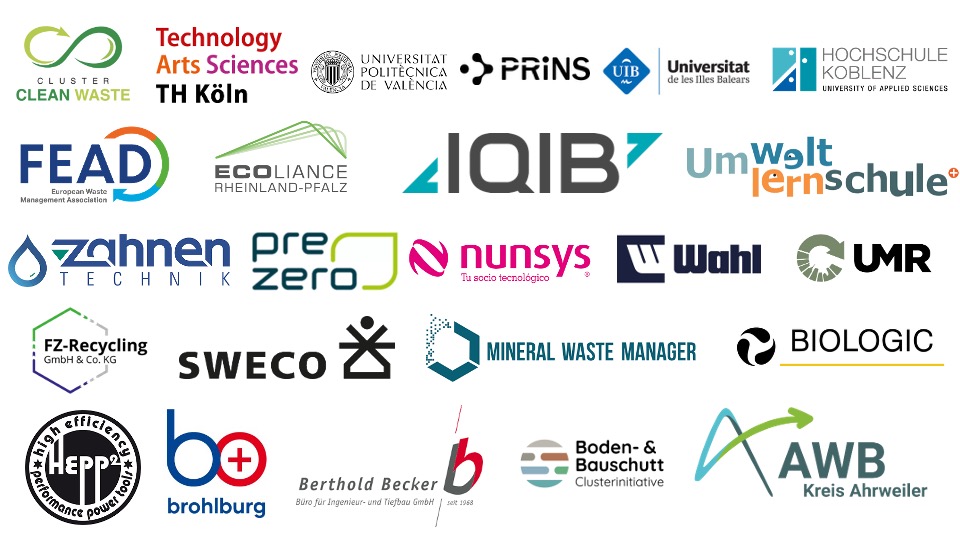
4º aniversario de las inundaciones en el valle del Ahr – Los expertos internacionales se centran en la cooperación
La cooperación, la cohesión y la buena comunicación entre todas las partes interesadas de la región conducen a la resiliencia
Las catástrofes causadas por las inundaciones son signos localizados de la crisis climática, pero el problema es global. Por eso las reuniones internacionales ayudan a hacer frente y adaptarse a la nueva situación. Para conmemorar el cuarto aniversario de la catástrofe de las inundaciones en el valle del Ahr, Thinking CircularÒ organizó una excursión por el valle del Ahr, talleres en la Escuela de Aprendizaje Medioambiental Plus de AWB Niederzissen y una conferencia en el campus de Remagen. La conferencia reunió a científicos, ingenieros, representantes de empresas y organizaciones de partes interesadas de Alemania, Países Bajos, Italia y España. Contaron con el apoyo de una red de empresas que aprecia el planteamiento del intercambio intensivo europeo.
Una excursión al valle del Ahr revela grandes similitudes
Las evidentes analogías entre las inundaciones que asolaron Alemania en 2021 y las de Valencia en 2024 proporcionaron elementos concretos para la reflexión. La excursión al valle del Ahr y los hallazgos de los científicos fueron especialmente decisivos en este sentido. En el valle del Ahr, Markus Becker dio explicaciones de experto en la depuradora de Sinzig, Robert Füllmann en las llanuras aluviales de Lohrsdorf, Maximilian Kranich de la empresa de construcción y desarrollo de la ciudad del distrito y Maximilian Schell de Zukunft Mittelahr sobre un nuevo enfoque de los puentes en el puente de Heppingen. Dio su recorrido bajo el título “Dernau: un pueblo se reinventa”. Las participantes Rosa Álvarez y Carmen Gil, Presidenta y Vicepresidenta de la Asociación de Víctimas de Dana 29O, afectadas ellas mismas por las inundaciones de Valencia, concluyeron: “Si miramos cómo está Alemania cuatro años después, en Valencia no estamos tan mal.”
También hay diferencias
Sin embargo, el diferente aspecto de las regiones afectadas se caracteriza principalmente por los valles y las amplias montañas que alimentaron los ríos desbordados. Un elemento común es el número similar de víctimas mortales. Según Rosa Álvarez y Carmen Gil, la admirable respuesta de la ciudad de Valencia tras la catástrofe y la ayuda voluntaria en el Ahr son factores clave que explican por qué la situación en España permite mirar con optimismo la reconstrucción en el valle del Ahr. “La esperanza es lo que nos hace seguir adelante”, subrayan.
“Esperanza, resiliencia, reparación y justicia: no debemos olvidarlo, porque es muy importante”. Tanto Álvarez como Gil pudieron hablar con personas que, como ellos, se vieron afectadas por el horrible impacto de la tragedia en una región de Alemania que sigue anclada en los acontecimientos de 2021. Hablaron, entre otros, con el arquitecto de Heimersheim Udo Heimermann, para saber cómo vivió aquellas dramáticas horas y cómo contribuyó a la paulatina vuelta a la normalidad. La lección aprendida: “La cohesión dentro de la región es el factor decisivo; como en el valle del Ahr, también en Valencia tras los daños causados por el Dana”. Otra lección aprendida es que las medidas de seguridad aplicadas deben guiarse por el principio de cooperación entre administraciones, una variable que no funcionó del todo en ninguna de las dos catástrofes.
El intercambio es necesario
La conclusión del acto, al que asistieron un centenar de expertos y en el que también se reunieron con el Secretario de Estado del Ministerio de Medio Ambiente, Michael Hauer, y la eurodiputada Jutta Paulus (Los Verdes), fue: “Es necesario un diálogo directo entre los afectados, los responsables de la reconstrucción en los municipios, la comunidad científica y las autoridades”. Adquirir un conocimiento mutuo ayuda a categorizar los propios retos y permite aprender desde una perspectiva externa. “Los participantes quieren seguir trabajando en este sentido”, afirma Eveline Lemke. En este contexto, los resultados se resumieron en un documento final de Thinking CircularÒ , que también representa un llamamiento a la UE para que facilite este tipo de cooperación. Puede encontrar el documento final en alemán, inglés y español aquí:
https://thinking-circular.com/wp-content/uploads/2025/07/Ergebnispapier-4.7.-DEENES.pdf
Los temas del documento final se debatieron con Michael Hauer (Secretario de Estado de Protección del Clima, Medio Ambiente, Energía y Movilidad de Renania-Palatinado), Jutta Paulus (eurodiputada de Los Verdes/Alianza Libre Europea), Claudia Mensi (Presidenta de la Asociación Europea de Gestión de Residuos FEAD) y Arthur ten Wolde (Director Ejecutivo de Ecopreneur.eu).
Los participantes se mostraron partidarios de reforzar la cooperación para intercambiar experiencias y, en particular, de velar por que la gestión del agua, los residuos y el suelo se refuerce en todos los sectores en una fase temprana de la crisis.
Más información y presentaciones:
El Dr. Jorge Alacid López es doctor en teoría de la comunicación, periodista y jefe de coordinación del diario Las Provincias, el mayor y más antiguo medio de comunicación de Valencia. En su presentación, hizo hincapié en el papel de la prensa a la hora de concienciar y combatir las noticias falsas proporcionando información sólida para que la región pueda seguir desarrollándose. También hizo que los participantes se emocionaran con el acto al proyectar este vídeo sobre el trabajo de sus periodistas:
https://www.youtube.com/watch?v=PzAJfuLCJU8
La gestión de residuos no se incluye automáticamente en los planes de emergencia ni en los grupos de crisis. Esto debe cambiar, porque la gestión de residuos es un elemento central de la atención post-crisis. Esta fue la conclusión a la que llegó un grupo de científicos de Alemania y España. La presentación del Prof. Miguel Ángel Artacho Ramirez, PRINS, Universidad Politécnica de Valencia, puede consultarse aquí:
Salvador Ortí, del Cluster de Residuos Limpios de España, se esfuerza por mejorar el medio ambiente contaminado y pone a disposición tecnologías medioambientales a través de su red. Los implicados esperan que esto facilite a las autoridades el cumplimiento de las directivas comunitarias sobre residuos y la normativa medioambiental. Haga clic aquí para ver la presentación sobre el papel del cluster en la catástrofe de las inundaciones:
El profesor Joan Estrany, de la Universidad de las Islas Baleares y responsable del Observatorio de Riesgos y Emergencias Naturales de Baleares, ha podido informar sobre la red de vigilancia medioambiental Riscbal que se ha puesto en marcha. Ya se trate de riesgos de inundaciones, incendios forestales o peligros gravitacionales: El sistema de alerta temprana se basa en datos y modelos en tiempo real y pretende salvar vidas. Haga clic aquí para ver la presentación:
https://thinking-circular.com/wp-content/uploads/2025/07/4.estrany_ahr_valley_25.pdf
El profesor Alexander Fekete, de la Universidad Técnica de Colonia, centra su investigación en la cooperación entre las partes interesadas. La describe como un factor clave del éxito. Las interacciones entre crisis, residuos, agua y gestión del suelo son de vital importancia.
https://thinking-circular.com/wp-content/uploads/2025/07/250704-Fekete-Ahrtal.pdf
El Prof. Dr. Lothar Kirschbauer, de la Universidad de Ciencias Aplicadas de Coblenza, informó sobre la red científica KAHR, y el Dr. Bert Droste-Francke, de IQIB, aportó información adicional. Puede consultar las presentaciones aquí:
https://thinking-circular.com/wp-content/uploads/2025/07/Droste-Franke_4ter_JT_Folien_KAHR1.pdf
Karsten Freichel, de Zahnen Technik GmbH, presentó un innovador sistema de previsión y alerta temprana de futuras inundaciones.
https://thinking-circular.com/wp-content/uploads/2025/07/04.07.2025-Zahnen-Technik-Englisch.pdf
Jesús Pérez, Socio Director de la empresa tecnológica Nunsys y Presidente del Cluster de Residuos Limpios, presentó sus perspectivas sobre la transición ecológica.
https://thinking-circular.com/wp-content/uploads/2025/07/NUNSYS-2024-DANA.pdf
Queremos dar las gracias a todos los patrocinadores por el éxito del evento.